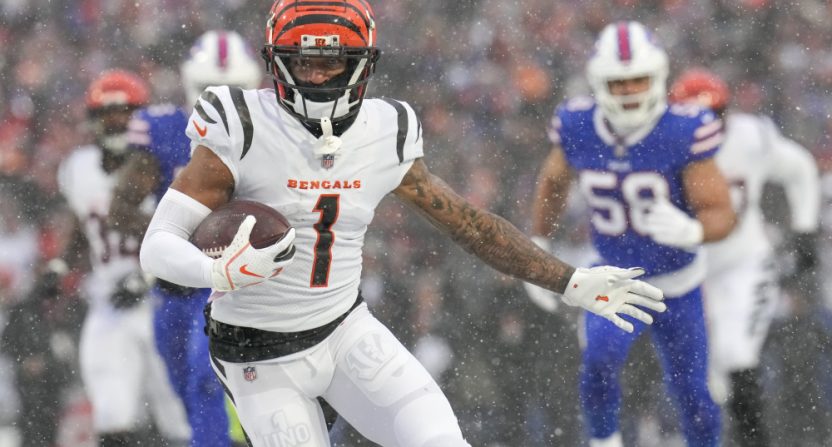Check your wallet. Is there a credit card in there? Maybe a wad of twenties? Good—you’re going to need all of it. Watching the game at home has never been more expensive or cumbersome, a frustrating though perhaps unavoidable byproduct of the streaming revolution.
You may have seen the announcement earlier this week that Peacock, a streaming service owned and operated by NBCUniversal, will air an NFL Wild Card game this upcoming season, paying an obscene $110 million for the game’s exclusive broadcast rights.
It’s easy to become desensitized to a development like this in the ever-evolving landscape of live programming, where TV execs eat nine-figure deals for breakfast, lunch, and dinner. But let’s not understate the gravity of this moment, which should be acknowledged for what it is—a watershed event in sports media.
Think about what this means. NBC, in its lust to make Peacock a legitimate player in the streaming arms race, has put an actual NFL playoff game behind a paywall. This is worrying on a number of levels, making broadcasts less accessible, an excruciating chore for older fans who may not be as tech-savvy as their millennial and Gen Z counterparts.
And while Peacock’s nominal $4.99 monthly fee isn’t as cost-prohibitive as other platforms, it’s another hoop to jump through, the latest inconvenience levied at audiences, an overt cash grab monetizing the viewer experience. You can hardly blame NBC, in an increasingly saturated terrain occupied by the likes of Prime Video, Hulu, Netflix, HBO Max, Apple TV+, Disney, and Paramount+, for putting all their eggs in the streaming basket, strong-arming customers into paying for their product.
Putting content behind a paywall is hardly an original idea. The movement was soft-launched years earlier with Thursday Night Football (now the exclusive domain of Amazon) serving as a token guinea pig, providing a blueprint of sorts for future endeavors. Whereas the big four networks (NBC, CBS, ABC, and Fox) used to enjoy a relative monopoly on broadcast rights, the confluence of streaming and social media has flipped sports on its head, prompting industry powerbrokers to explore new revenue streams.
The resulting sea change has come at great expense to sports fans, leaving them to navigate a convoluted minefield of subscription-based streamers with no assurance of quality. In fact, many would argue the on-air product has suffered, eschewing nuance for celebrity and star power, usually in the form of ex-athletes and overpaid retreads like the irritable, post-NBC incarnation of Al Michaels.
Like it or not, this is undoubtedly where sports are headed with countless examples of teams and leagues dipping their toes in the streaming waters, from the Yankees airing 20 regular-season games on Prime Video to Peacock gaining a foothold in MLB with its weekly presentation of Sunday Leadoff.
Fans may not go out of their way for an MLS game if it’s behind a paywall (a reality seemingly confirmed by Apple TV’s month-long free preview offer), but they will for football, an unimpeachable American right as star-striped and patriotic as cold beer and Fourth of July fireworks.
Corrupt or not, the NFL always wins, surviving repeated scandals with nary a repercussion, capitalizing on an obsession that, for better or worse, defines our culture. The money faucet keeps running, with expanded playoffs, international games, betting partnerships, and a growing primetime slate (Amazon will debut a Black Friday game this year) propping up an entertainment behemoth seen by many as too big to fail. Streaming is just another piece of that overarching puzzle.
In the age of smartphones and 5G internet, most consumers are already conditioned to stream their favorite shows and movies on Netflix and Hulu, rarely if ever seeking out its competitors on network television. Viewed through that prism, signing up for Peacock (already free to Xfinity users), shouldn’t be a big ask, especially for diehards spending so much of their disposable income on Sunday Ticket (which moves from DirecTV to YouTube TV this fall) and the Red Zone Channel.
But that’s not the point. The NFL’s streaming portfolio is only getting bigger, lending further credence to John Skipper’s ominous prediction the Super Bowl will eventually be a pay-per-view event, burdening millions with unnecessary fees. It’s a harrowing portrait of late-stage capitalism and its bleak cynicism, reducing fandom to numbers on a spreadsheet.
The implications here are jarring, a stirring encapsulation of the heartless monster sports business has become, viewing fans, not as people, but as expendable parts, open wallets waiting to be milked for every last dollar. Peacock is a gateway drug to get you hooked, the inevitable—but no less dystopian—conclusion to a decades-long turf war pitting Average Joe against the spineless excess of corporate America.
Sure, it’s manipulative and self-serving, but there’s profit to be had and when the NFL senses an opportunity to fatten its bottom line, it usually does. You might recall the following quote from Season 3 of Succession, when Lady Caroline said this of her ex-husband, Logan Roy: “He never saw anything he loved that he didn’t want to kick, just to see if it would still come back.” It’s the description of a ruthless conqueror, which is precisely what the NFL is, seeking a competitive edge wherever it may find one.
Admittedly, there’s an element of stubbornness in resisting what is very likely the future of broadcast television, phasing out mainstream cable for an a la carte menu of subscription-based, online offerings. Think of Steve Jobs’ legacy, hailed as a pioneer for deliberately making Apple products incompatible with other operating systems, taking the decision out of consumers’ hands by funneling them into new technology. Sports leagues (and the entertainment industry at large, if you want to go macro) are taking a similar approach, force-feeding us a diet we may not want but will reluctantly accept, because what other choice do we have?







